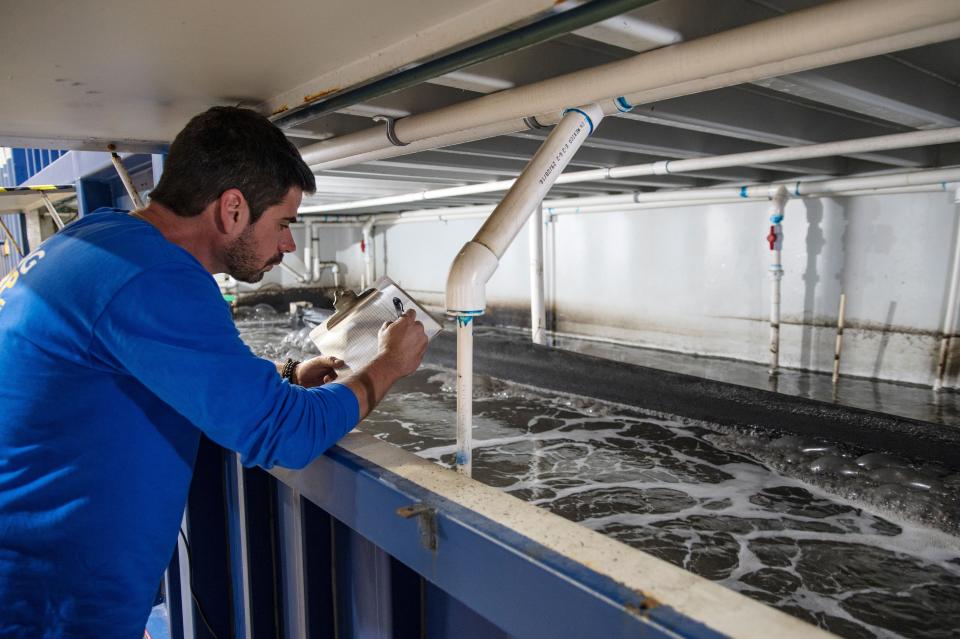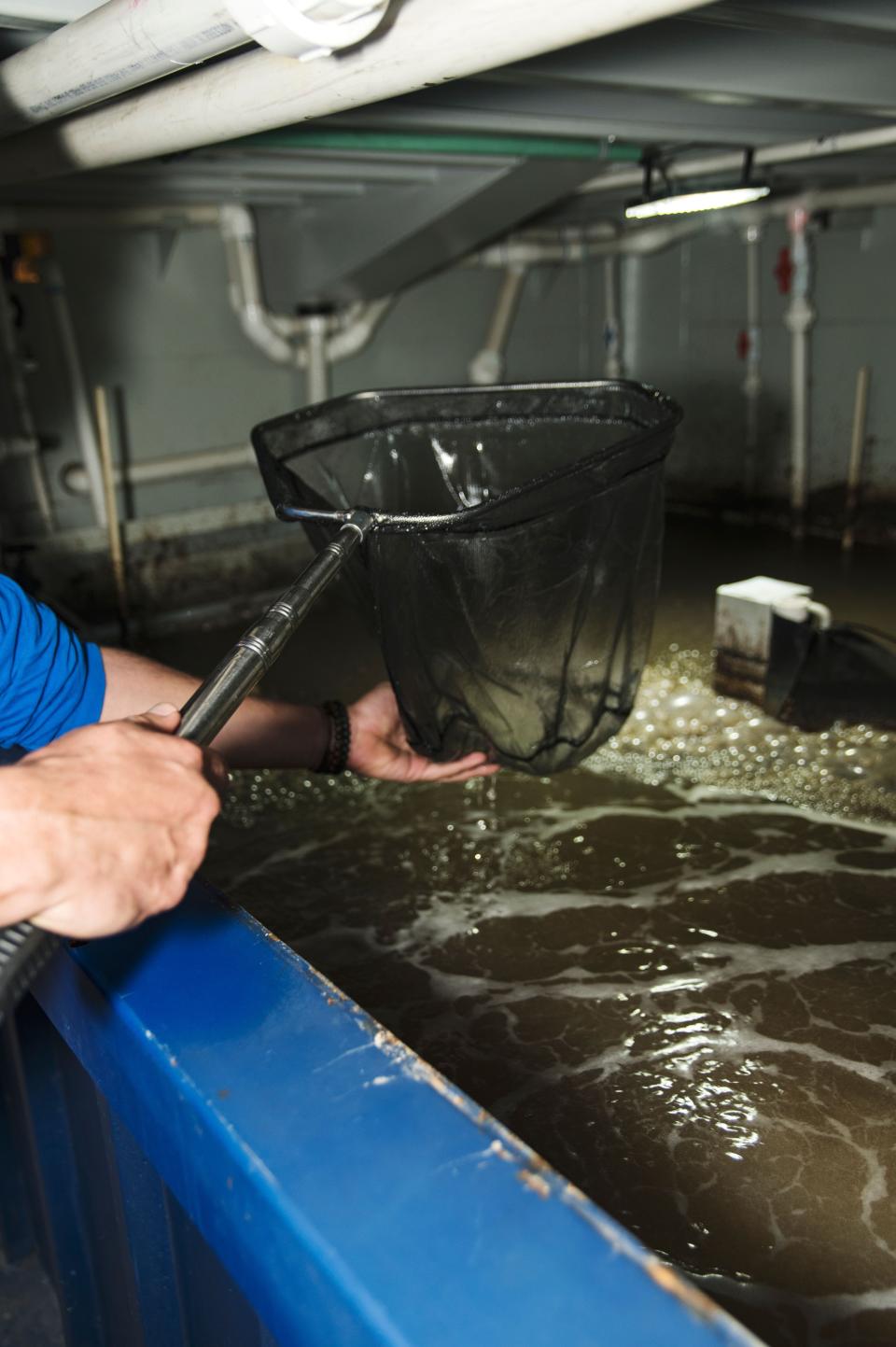Farm-to-table shrimp in Indianapolis? How this tech company is making it possible
The Indianapolis area is now able to get shrimp grown close to home.
Atarraya Inc., a Mexico-based company that manufactures and sells shrimp farming equipment is selling to the public shellfish grown from its Indianapolis model farm.
The sustainable shrimp farm at 2075 S. Belmont Ave. is a demo for its artificial intelligence-powered Shrimpbox operations in the U.S.
After starting with 12 vertical farms in Mexico, with tech housed in shipping container-like boxes, the company began testing them here in 2022. The equipment is marketed to restaurants and food service operations that are looking to grow their own shrimp, said Attaraya founder and CEO Daniel Russek. Caterers who need lots of shrimp would be among businesses likely to be interested in farming their own, he said.
And now Hoosiers can taste the results with a farm-to-table model for seafood.
On Tuesday, the company launches a website – aguablancaseafood.com – for shrimp orders and weekly deliveries or pick-up at the farm.

Shrimp are sold in bags, with buyers being able to purchase one to 10 pounds of each size shrimp offered under the Agua Blanca Seafood brand. Right now, delivery is just for us locals.
Folks in Marion County can have their orders brought to their doors Tuesdays and Thursdays. Others will have to pick up their orders from the facility between 10 a.m. and 2 p.m. on those same days, and can tour the farm while there.
Customers should not expect a lower-cost product than what they can find at a grocer, said Mariana Madrigal, Atarraya's marketing manager.
“It’s a premium product. It’s locally-produced. It’s fresh. We don’t have antibiotics. It’s more sustainable than other sources,” Madrigal said. "The benefit is you have local production and that you can have transparency in your food.”
They’re grown using biotechnology, artificial intelligence and automation, allowing shrimp to be farmed anywhere in the world. An automatic feeding system provides the precise amount of feed needed at optimal times to avoid waste.
Catfish farm: Fresh Indiana seafood is coming soon and Caplinger's is 'super stoked' to offer it
The farms are seeded with whiteleg shrimp every four to six weeks. The shrimp are harvested twice a week.
There are eight boxes in operation at the Indianapolis location now. The plan is to grow to 20 boxes, and expand the model to other parts of the U.S.
It’s part of the company’s goal to make shrimp more sustainable and accessible, as well as more nutritious, Russek said.
Demand for shrimp, already the most popular seafood in America, continues to grow, with the average American eating four pounds of shrimp annually. About 90% of shrimp consumed in America is imported, either wild caught or farmed, according to the ocean conservation group Inland Ocean Coalition.
The vast majority of shrimp imported to the U.S. comes from international shrimp farms which contribute to the pollution of surrounding waters and threaten coastal forestry that protects coastlines from hurricanes, erosion, and storm surges, the group says.
Meanwhile, the wild-caught process entails dragging the seabed and ruining other ocean life. For each pound of shrimp harvested out of the ocean, up to 20 pounds of non-targeted marine life such as turtles, dolphins, sharks and sponges are trapped and killed and discarded in the process, according to the coalition.
And both processes use antibiotics and preservatives that can be harmful to humans, Russek said.
“The scale of this destruction is mind-blowing,” he said.
Louisiana dining: Drew Brees-backed Walk-On's opening in troubled bar spot, bringing sports, Cajun eats
Atarraya, headquartered in Oaxaca, Mexico, has been in research and development for most of its 12 years. The company has about 90 employees total with other Mexico operations in Campeche and Mexico City.
It already had some U.S. customers – most in food service – but brought its shrimp aquaculture equipment to Central Indiana as a way to prove the tech could be utilized anywhere. Farmers will go to the facility to learn to grow and harvest shrimp.
“We wanted to show that we can grow shrimp anywhere in the world. So if we can do it in landlocked, horrible-winter Indiana, we can do it anywhere in the world,” he said.
He said state development officials reached out to him.
“We decided Indianapolis made the most sense because it's urban farming. It’s a decent sized city and manageable in terms of traffic and all of that,” he said. “Also it's for supply chain because I think that the state of Indiana has made this very clear vision for turning the state into the Silicon Valley of food tech and agritech."

The company signed a lease at a warehouse on Belmont Avenue in June. It was harvesting by November.
A team of five people work at the Indianapolis farm, including biotech and engineering managers developing protocols for a franchise model. A software system developed in 2016 does most of the lifting.
“We're demonstrating how the technology works to other would-be farmers and as a training farm,” Russek said.
The company will invest up to $4.8 million in the local operation and create up to 65 new jobs here by the end of 2025.
The Indiana Economic Development Corporation is investing up to $1 million in Atarraya through incentive-based tax credits and up to $50,000 in training grants.
Farmers markets: 20+ Indianapolis-area places to visit this summer
Fresh Indiana shrimp prices currently range from $8.90 to $14.90 per pound.
“Basically, anybody who wants local shrimp from Indianapolis would be able to buy it from there," Russek said.
The technology, he said, “will allow other farmers to basically get into the farming industry.” The cost to establish a farm with about 20 shrimp boxes is $800,000 to $1 million.
Contact IndyStar reporter Cheryl V. Jackson at cheryl.jackson@indystar.com or 317-444-6264. Follow her on Twitter:@cherylvjackson.
This article originally appeared on Indianapolis Star: Agua Blanca Seafood offers shrimp farmed in Indianapolis

